|
|
|
Sort Order |
|
|
|
Items / Page
|
|
|
|
|
|
|
| Srl | Item |
| 1 |
ID:
131493
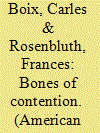

|
|
|
|
|
| Publication |
2014.
|
| Summary/Abstract |
Human osteological data provide a rich, still-to-be-mined source of information about the distribution of nutrition and, by extension, the distribution of political power and economic wealth in societies of long ago. On the basis of data we have collected and analyzed on societies ranging from foraging communities to the ancient Egyptian and modern European monarchies, we find that the shift from hunting and gathering to complex fishing techniques and to labor-intensive agriculture opened up inequalities that had discernible effects on human health and stature. But we also find that political institutions intervened decisively in the distribution of resources within societies. Political institutions appear to be shaped not only by economic factors but also by military technology and vulnerability to invasion.
|
|
|
|
|
|
|
|
|
|
|
|
|
|
|
|
| 2 |
ID:
098224
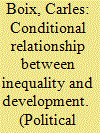

|
|
|
| 3 |
ID:
058953
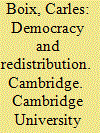

|
|
|
|
|
| Publication |
Cambridge, Cambridge University Press, 2003.
|
| Description |
xiii, 264p.
|
| Series |
Cambridge studies in comparative politics
|
| Standard Number |
0521532671
|
|
|
|
|
|
|
|
|
|
|
|
Copies: C:1/I:0,R:0,Q:0
Circulation
| Accession# | Call# | Current Location | Status | Policy | Location |
| 049190 | 320.6/BOI 049190 | Main | On Shelf | General | |
|
|
|
|
| 4 |
ID:
110559
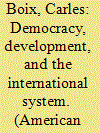

|
|
|
|
|
| Publication |
2011.
|
| Summary/Abstract |
Resolving a controversy on the relationship of development to democratization, this article expands the time period under study with panel data running from the early nineteenth century (a time where hardly any country was democratic) to the end of the twentieth century, and shows a positive and significant effect of income on the likelihood of democratic transitions and democratic consolidations. The estimations hold after I control for country and time effects and instrument for income. Results reveal that the effect of income varies across income levels and across eras. First, income has a decreasing marginal effect on democratization. In already developed (and democratized) countries, any extra growth has no further effect on the level of democracy. Second, the structure of the international system affects the resources and strategies of pro-authoritarian and pro-democratic factions in client states. The proportion of liberal democracies peaks under international orders governed by democratic hegemons, such as the post-Cold War period, and bottoms out when authoritarian great powers such as the Holy Alliance control the world system.
|
|
|
|
|
|
|
|
|
|
|
|
|
|
|
|
| 5 |
ID:
083116
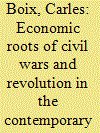

|
|
|
|
|
| Publication |
2008.
|
| Summary/Abstract |
To explain the distribution of civil wars, guerrilla warfare, and revolutionary outbreaks, the literature on modern political violence has shifted, broadly speaking, from a modernization perspective that emphasized the role of material conflict and of grievances to a more recent research program that stresses the geographical and organizational opportunities that insurgents may have to engage in violence. Drawing on those lines of inquiry equally, this article offers an integrated analytical model that considers both the motives and the opportunities of states and rebels. Civil wars, guerrillas, and revolutionary outbreaks are seen as a result of the nature and distribution of wealth in each country. Systematic and organized violent conflicts are most likely in economies where inequality is high and wealth is mostly immobile, that is, in societies where those worse off would benefit substantially from expropriating all assets. Violence is conditional on the mobilizational and organizational capacity of challengers and on the state capacity to control its territory. The theory is tested on data on civil wars from 1850 to 1999 for the whole world and on data on guerrilla warfare and revolutionary episodes spanning the years from 1919 to 1997 across all countries.
|
|
|
|
|
|
|
|
|
|
|
|
|
|
|
|
| 6 |
ID:
097025
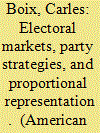

|
|
|
|
|
| Publication |
2010.
|
| Summary/Abstract |
Following Kreuzer's (2010) methodological pleas, I first reflect, at the conceptual level, on the ways in which historical research and political science should be related to each other. I then apply some of those considerations to examine two key "moments" in the theory (and history) of institutional choice that I first presented in Boix (1999): the underlying conditions that shaped the interests of different parties toward proportional representation, and the process through which those interests were translated into actual legislative decisions.
|
|
|
|
|
|
|
|
|
|
|
|
|
|
|
|
| 7 |
ID:
169320
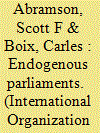

|
|
|
|
|
| Summary/Abstract |
Institutional constraints on executive behavior are commonly understood to be crucial constitutional features that limit state expropriation, protect property rights, and promote economic development. Combining new data describing the presence of parliamentary constraints for the entire European continent with data on city sizes, we build upon theories of endogenous economic growth to demonstrate that paths of both economic and political development over the long span of European history from 1200 to 1900 are the consequence of a common process of urban agglomeration. In doing so, we provide evidence that both outcomes—the existence of constraining institutions and growth—are driven by initial conditions that fostered technical know-how embodied in urban-dwelling artisans who, in turn, were able to force institutional limits on rulers’ actions. Hence, instead of reflecting a true underlying cause of development, parliamentary constraints are themselves outcomes determined by an endogenous process of growth.
|
|
|
|
|
|
|
|
|
|
|
|
|
|
|
|
| 8 |
ID:
079745
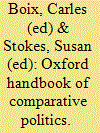

|
|
|
|
|
| Publication |
Oxford, Oxford University Press, 2007.
|
| Description |
xi, 1021p.
|
| Standard Number |
9780199278480
|
|
|
|
|
|
|
|
|
|
|
|
Copies: C:1/I:0,R:1,Q:0
Circulation
| Accession# | Call# | Current Location | Status | Policy | Location |
| 052873 | 320.3/BOI 052873 | Main | On Shelf | Reference books | |
|
|
|
|
|
|
|
|
|